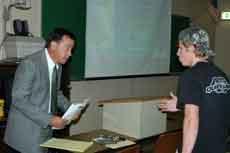Two Nicholls alumni addressed biology students on Sept. 13 on the importance of Louisiana’s coast and ports to the state’s economy as well as environmental issues concerning the wetlands. Kerry St. Pe, executive director of the Barataria-Terrebonne National Estuary Program, and Henri Boulet, executive director of LA 1 Coalition, spoke as part of an environmental seminar.
According to St. Pe, the estuary area is the fastest disappearing landmass in the world, losing 24 square miles per year. In addition to that, 118 square miles of wetlands were lost during Hurricane Katrina.
Quinton Fontenot, assistant professor of biological sciences, said land loss makes Nicholls more vulnerable to hurricanes.
An issue St. Pe said affects the estuary is hydrologic modifications, which are man-made changes that affect the way water moves through the watershed system.
Because of the modifications to the river systems, the Mississippi River’s suspended load of sediment, which is silt or clay transported by river currents, has declined 80 percent since 1850, St. Pe said. This is one reason why the delta area cannot use sediment to build itself back up.
Richard Fontenot, biology graduate from Ville Platte, said he was glad he attended the seminar.
“I had no idea about the rate of land loss or the amount of organizations involved in coastal restoration,” Fontenot said.
St. Pe said because of the Mississippi River’s scarce suspended load, sediment from the bottom of the river should be transported via pipelines to the estuary to remedy land loss.
Boulet stressed the importance of Port Fourchon to Louisiana and spoke of improvements needed to the infrastructure leading to the port.
The project, which includes 47 miles of highway improvements from Raceland to Port Fourchon and Grande Isle, is projected to be complete within 10-15 years. Hwy. 1 will be a four-lane highway from Raceland to Golden Meadow. The section from Golden Meadow to Port Fourchon will be an elevated causeway.
Boulet said 80 percent of oil and 87 percent of gas from U.S. offshore waters comes from Louisiana’s offshore, and Port Fourchon is the southernmost point of Louisiana that can be reached by truck, making it more economical for oil companys’ employees to access their rigs through Port Fourchon.
“The port will offer tremendous economic opportunities for Nicholls graduates,” Boulet said.








